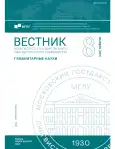METAPHORIZATION MODELS OF EVALUATIVE STATEMENTS
- Autores: Kuleshova D.Y.1, Smurova O.V.1
-
Afiliações:
- Moscow State Linguistic University
- Edição: Nº 8(889) (2024)
- Páginas: 85-91
- Seção: Linguistics
- URL: https://journal-vniispk.ru/2542-2197/article/view/298725
- ID: 298725
Citar
Resumo
The article examines representatives of the concept of “general evaluation” using examples from the BNC. The models are identified, according to which the metaphorization of general evaluative values of ameliorative and pejorative nature occurs. It is shown that the general evaluative predicates constitute condensed conceptual metaphors that uniquely qualify the object of evaluation in axiological terms, whereas non-metaphorized variants of evaluative judgments need additional explication.
Sobre autores
Daria Kuleshova
Moscow State Linguistic University
Autor responsável pela correspondência
Email: kuleshova7v@yandex.ru
Lecturer at the Department of Grammar and History of the English Language Faculty of the English language Moscow State Linguistic University
RússiaOlga Smurova
Moscow State Linguistic University
Email: olsmurova@yandex.ru
PhD (Philology), Assistant Professor at the Department of Grammar and History of the English Language Faculty of the English language Moscow State Linguistic University
RússiaBibliografia
- Boldyrev, N. N. (2007). Knowledge representation in the system of language. Voprosy kognitivnoy lingvistiki, (4), 19–29. (In Russ.)
- Telia, V. N. (1988). Metafora v yazyke i tekste. Metaphor in language and text. Moscow: Nauka. (In Russ.)
- Wolf, E. M. (2002). Funktsionalnaya semantika otsenki. Functional semantics of evaluation. Moscow: Editorial URSS. (In Russ.)
- Lakoff, G. (1993). The contemporary theory of metaphor. In A. Ortony (ed.), Metaphor and thought. Cambridge University Press, 202–251.
- Arutyunova, N. D. (1999). Jazyk i mir cheloveka. Language and the human world. Moscow: Jazyki russkoj kultury. (In Russ.)
- Boldyrev, N. N. (2016). The typology of concepts and linguistic interpretation. Novaja Rossija: tradicii i innovacii v jazyke i nauke o jazyke (pp. 16–25): materialy dokladov i soobshhenij Mezhdunarodnoj nauchnoj konferencii, posvjashhennoj jubileju Zasluzhennogo dejatelja nauki RF, doktora filologicheskih nauk, professora L. G. Babenko. Moscow, Ekaterinburg: Kabinetnyj uchenyj. (In Russ.)
- Boldyrev, N. N. (2010). Yazykovaya otsenka v kontekste poznavatelnykh protsessov. Linguistic evaluation in the context of cognitive processes. Non multum, sed multa: u kognitivnyh istokov sovremennoj terminologii (pp. 47–56). Sbornik nauchnykh trudov v chest V. F. Novodranovoy. Moscow: Avtorskaya akademiya. (In Russ.)
- Arutyunova, N. D., (1988). Tipy yazykovykh znacheniy: Otsenka. Sobytie. Fakt. Types of language meanings: Evaluaion. Event. Fact. Moscow: Nauka. (In Russ.)
- Richards, A. (1936). The philosophy of rhetoric. New York: Oxford University Press.
- Lakoff, G., Johnson, M. (1980). The metaphors we live by. Chicago, London: University of Chicago Press.
- Kövecses, Z. (2002). Metaphor: A practical introduction. New York: Oxford University Press.
- Karasik, V. I., Sternin, I. A. (2007). Antologia contseptov. Anthology of concepts (Vol. 5). Volgograd: Paradigm. (In Russ.)
Arquivos suplementares










